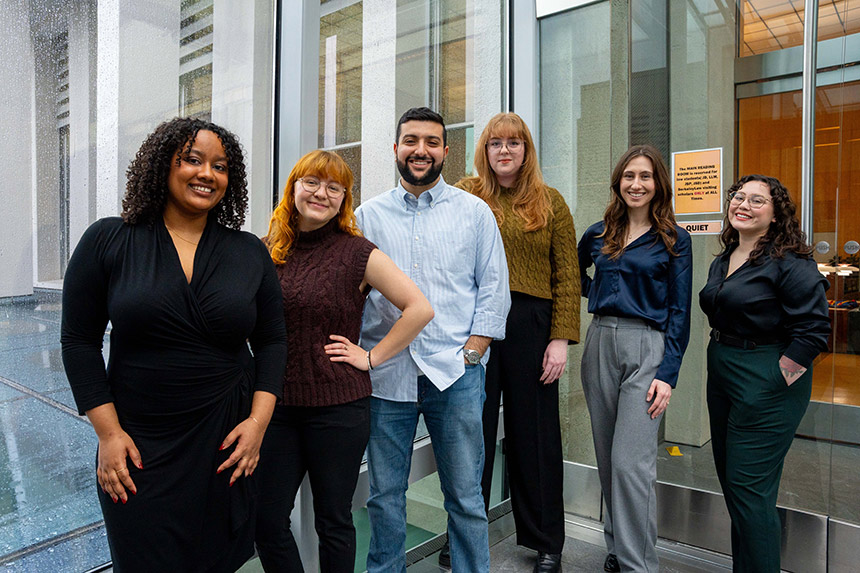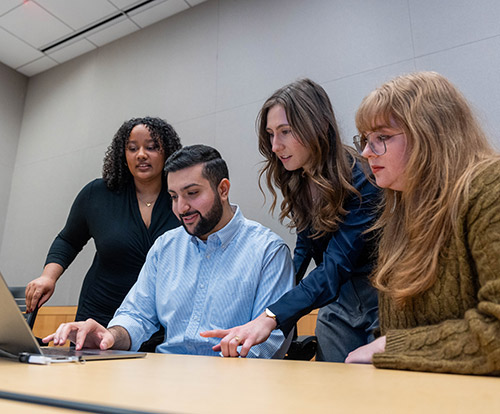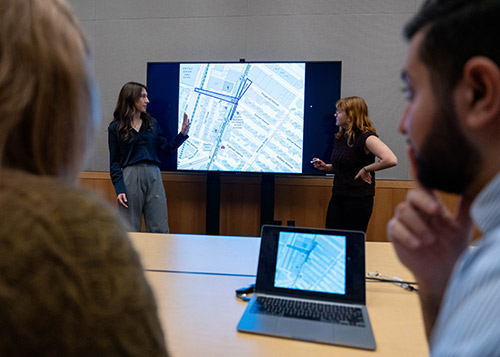
By Gwyneth K. Shaw
Government surveillance is hardly new — nor are efforts to ensure the state is respecting the civil liberties of innocent citizens while tracking legitimate suspects.
But in our era of ever-expanding technology, snooping is both more sophisticated and harder to spot.
Students in the Digital Rights Project (DRP), one of more than 40 Student-Initiated Legal Services Projects in Berkeley Law’s Pro Bono Program, were drawn to the group to focus on that intersection between technology, constitutionally-protected freedoms, and the social justice movement.
“The fight for civil rights is increasingly becoming a battle over how technology is used in places like courtrooms and by police departments, and future lawyers hoping to make a difference can only be successful if they can actually understand how the technology works,” says group co-leader Anan Hafez ’25. “My decision to join the Digital Rights Project stemmed from a desire to not just study this problem but to actively work on solutions that protect those who are most vulnerable to tech-based injustices.
“The project offered me a chance to put my passion into practice, helping to lead the charge in ensuring technology serves justice, not just efficiency or so-called neutrality. It’s about making sure our advancements in tech do not come at the cost of people’s rights and dignity.”
A wide net of surveillance
Recently, working with the ACLU of Northern California, the group helped score a major victory for privacy. Late last year, Google announced it would change its policy allowing reverse location searches, which will severely limit the use of geofence warrants by law enforcement agencies in San Francisco.
Geofence warrants effectively create an invisible boundary around a person or people police are trying to track. Within those lines, companies like Google are compelled to produce data on all mobile devices in that spot at a certain time. They’re increasingly common but pose significant Fourth Amendment questions because they’re the digital equivalent of a fishing net, sweeping in information from people who have no relation to the legal search.

Under the supervision of ACLU attorneys Jake Snow and Nick Hidalgo, DRP students helped with hundreds of hours of review of thousands of warrants in person at the San Francisco Criminal Court. They looked at geofence warrants issued from January 2018 to August 2021 and figured out where police used the warrants and who was potentially affected.
What they found, spelled out in a recent ACLU report, was stark: Geofence warrants stretch over blocks or even miles, capturing data from people in churches, medical centers, hotels, stores, and even private homes — all without their knowledge, let alone consent.
“The Geofence Project wasn’t just a legal challenge; it was a profound learning journey,” Hafez says. “Week after week, we visited the courthouse, painstakingly reviewing every non-sealed warrant from the last several years. The process of sifting through thousands of documents to identify geofence warrants was daunting yet exhilarating — like finding a needle in a haystack.
“This hands-on work, far removed from our theoretical studies in the classroom, was deeply grounding to the realities of criminal justice work.”
What’s more, the study found that geofence warrants disproportionately affect people of color, as they’re more likely to be used in particular neighborhoods.
“Analyzing the data coordinates captured by law enforcement in geofence warrants across San Francisco has definitely been the most interesting moment from this work,” says Nina Perez-Morales ’25, another DRP co-leader. “It not only reinforced my understanding of why geofence warrants are unlawful in their broad nature, but also made it undeniably clear how many people’s privacy rights are violated through the issuing of these warrants in even geographically small areas.”
‘An invigorating opportunity and motivating force’
Google’s reversal is evidence of the students’ huge impact. DRP’s leaders say the work had a similar influence on them.
“It was while combing through warrants during my 1L year that I felt like a future lawyer for the first time,” Emily Welsch ’25 says. Doing hands-on work through DRP has truly been an invigorating opportunity and motivating force throughout my time in law school.”
Heather DeMocker ’25 joined DRP because it tackles her longstanding interest in Fourth Amendment rights and digital media. Laws regulating online privacy and speech have fallen far behind the rapid growth of digital technologies, she says, especially where social media and other mobile apps are involved. There are also clear connections between criminal law and digital privacy, she adds.

“As someone with a systems-impacted family member, I want to bring a unique perspective on how data privacy affects incarcerated individuals. This includes attention to what civil liberties are diminished when someone is labeled a ‘felon’ and what personal data systems-impacted people have no control over,” she says. “Being from the Washington, D.C. area, I also know all too well how online extremism and disinformation can threaten democratic society. Google, Meta, and Twitter have each altered civic engagement by trapping us in echo chambers of outrage — and that outrage can and has spilled out of the computer and onto the Capitol steps.”
Maya Darrow ’25 came to Berkeley Law after working at a small tech company, where she saw how technology can be a force for good and the way conflicting interests have the potential to harm both users and the general public. She was thrilled to get hands-on experience right after starting classes.
“I decided to come to law school because I wanted to be involved in helping the law catch up with advancements in technology, particularly around privacy, intellectual property, and online speech,” she says. “I was so excited that I could get involved in many of the issues I was contemplating before law school through DRP, which is what led me to join the group and later to become a student leader.”
Similarly, Madison Lee ’25 says her involvement with DRP profoundly shaped her perspective on the law — and guided her toward areas she might not have considered without it.
“While I feel like I change my mind on what I’d like to do with my law degree at least every other week, I think the Digital Rights Project has really opened my eyes to a field of law that is literally being written in real time,” she says. “It’s very exciting to be surrounded by students and other leaders who are using their experience in the project to launch their careers in a bunch of different spaces. And, on top of that, I’ve been really lucky to be able to work with such a strong team that has influenced who I am at Berkeley.”
Hafez says the geofence victory was especially gratifying because of its legacy within DRP. Passed down from one group of leaders to the next, it showcased the enduring impact of committed student advocacy, he says.
“As a current leader, inheriting this project from its founders — who may never have anticipated such a tangible outcome — was both an honor and a testament to the power of persistent, informed action.”